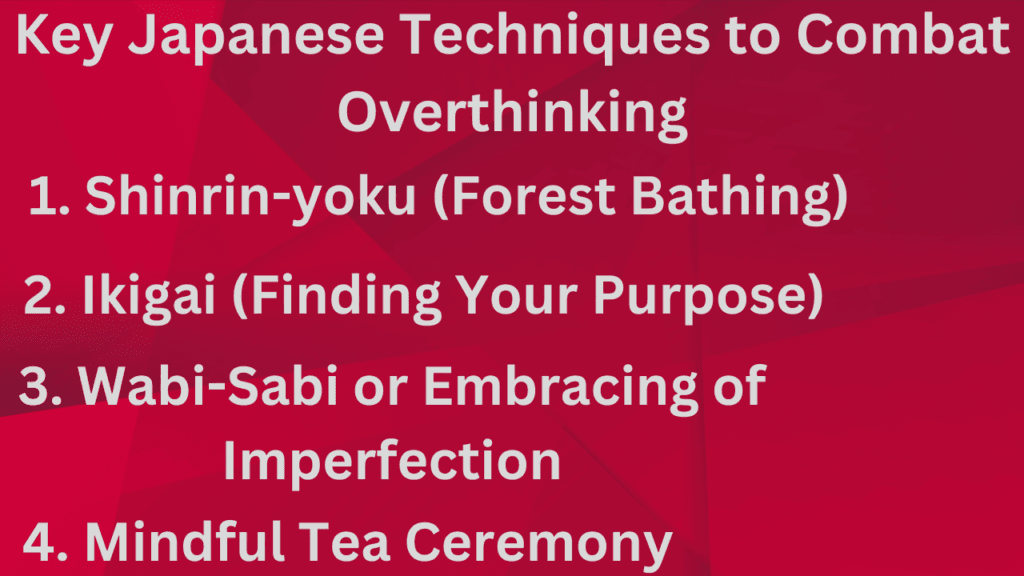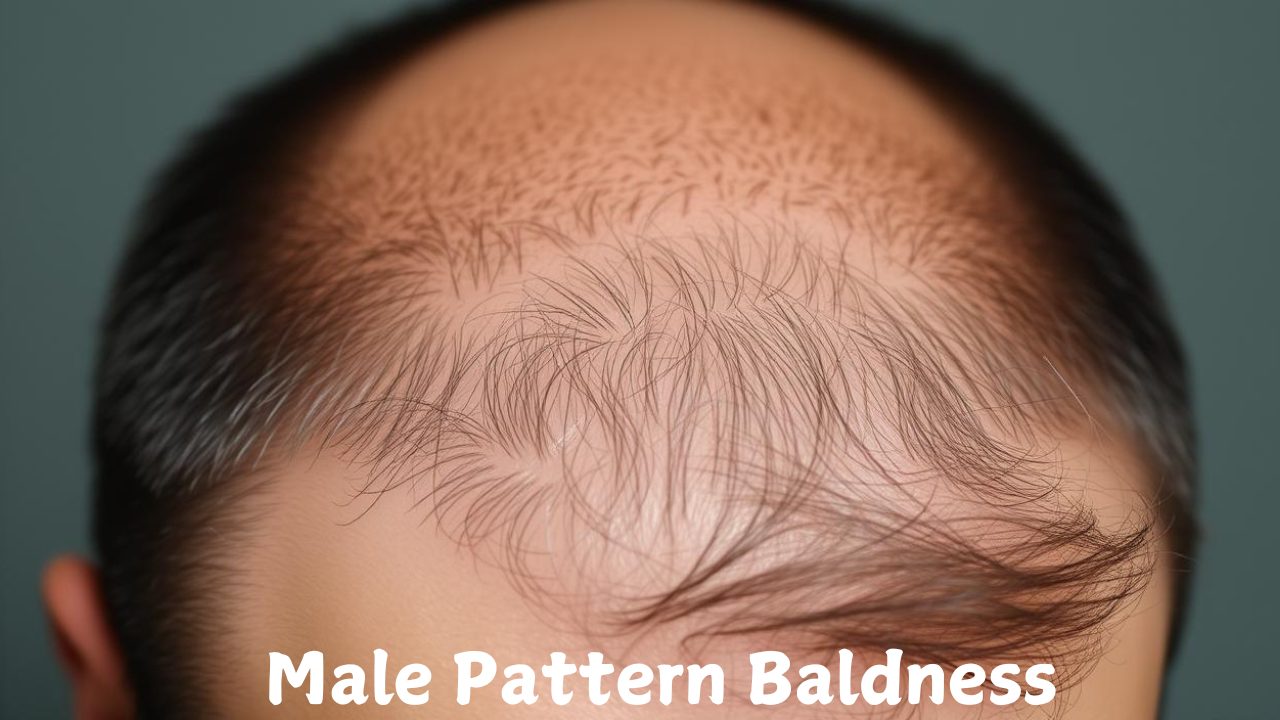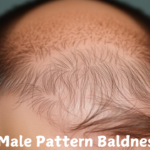Introduction:
Japanese Techniques| Are you still desperately sitting on your thoughts, trying to remember something, discussing a situation in your head, and getting anxious about troubles? If so, you’re not alone. More than half of all adults overthink, which results in stress, anxiety, and fatigues. But what if there were easily followed, efficient strategies for stopping such a pattern and getting your mind back to a healthy state?
Here we’ll try to unveil some of the greatest Japanese practices to assist you stop thinking excessively and find a sense of relief. These are the concepts beginning from the methods of ancient philosophers and ending with such modern trends as mindfulness that can and should be used in the modern world. At the end of this post, you will be clear on how to apply these techniques and support your efforts towards lowering stress and attaining a less ruffled mind.
Understanding Overthinking:

Definition of Overthinking:
Thinking too much may be redefined in the following way: Overthinking involves lingering too much on the thoughts which are most often accompanied with indecision and anxiety. These can include, negative thought patterns regarding interactions that have happened, distress over the future and difficulty with decisions.
Common Triggers:
Knowing what which cases overthinking is essential. Here are some common triggers:
- Stressful Situations: Getting to class, a test, or an important decision.
- Perfectionism: Perfectionism associated with this control can create a scenario where the decision maker could go over things and over things in their mind.
- Past Experiences: Fears related to functioning, which include guilt or concern about past errors.
The Mental Toll:
The psychological effects of overthinking can be significant, including:
- Increased Anxiety: Heightened worry and tension.
- Depression: A feeling of despair or chronic grief.
- Burnout: Stress and confusion caused by exhaustion in brain activities.
The Japanese Approach to Mental Clarity:
Japanese culture insists on focus and equilibrium. Here’s how these principles can aid in overcoming overthinking:
Zen Philosophy:
Zen Buddhism has rich traditions, the main idea of which is the unity of time and acceptance of reality. It makes people cast away negative thoughts and go with the simplicity.
Key Japanese Techniques to Combat Overthinking:

1. Shinrin-yoku (Forest Bathing)
Definition:
Shinrin-yoku means literally ‘bathing in the forest’ – an opportunity to be conveyed to nature in a calmed kind of way focusing on all five sensory organs.
Benefits:
- Stress Reduction: Research indicates that visits to parks help reduce stress hormone cortisol.
- Enhanced Mood: We feel so good when we are surrounded by nature.
Practical Tips:
- Choose a Nearby Forest or Park: Ensure that your siting situation is well endowed with green vegetation.
- Engage Your Senses: Be sensitive to noises, odours and experiences.
- Unplug: It is purposely set in the style of an escape room, meaning no personal belongings are allowed even your phone.
2. Ikigai (Finding Your Purpose)
Definition:
Ikigai is the Japanese term which translates to the “a purpose of being”. It is all about discovering what gives people a reason and passion to wake up in the morning.
Benefits:
- Clarity of Thought: Knowing ones purpose is important in light of the fact that it assists with sorting out interferences.
- Increased Motivation: Clarity of purpose drives people up and takes away fear.
Exercise: Finding Your Ikigai:
- List Your Passions: Write down what you love.
- Identify Your Skills: Note what you’re good at.
- Consider What the World Needs: How can you add value?
- Find Overlap: Make an effort to identify what the lists you created contain that is similar.
3. Wabi-Sabi or Embracing of Imperfection
Definition:
Wabi-sabi is the aesthetic of impermanence or appreciation of things that are broken, decayed and aging.
Benefits:
- Reduced Pressure: Relaxing on the need for perfection reduces the levels of stress associated with it.
- Greater Appreciation for Life: This philosophy consist in being thankful for the current moment.
Mindfulness Practice:
- Observe Your Surroundings: Seek out things that are real and have been left untreated by the hand of man.
- Reflect on Your Own Life: When you have made this list count your mistakes and treasure the progress that you have made.
4. Mindful Tea Ceremony:
Overview:
The programme of the served tea is derived from the Japanese art of the tea ceremony where the focus is made on concentrating and being present.
Benefits:
- Grounding Experience: Drinking tea brings people to serenity while observing all the procedures during its manufacturing.
- Mindfulness in Action: Again, fully participating in the process helps the mind to become blank.
Guided Practice:
- Select Your Tea: I like selecting a type of tea I prefer most.
- Prepare Mindfully: Only three movements are involved: boiling water and pouring, and the time required to steep.
- Enjoy the Moment: Breathtaking quality of the tea is its smell and flavor and one should not get distracted from this.
Practical Tips for Everyday Life:
Daily Mindfulness Activities:
- Meditation: Spend 5 to 10 minutes a day with your focal point being your own breath.
- Journaling: Take notes about yourself and your mental health to help empty your head.
- Deep Breathing: Performance anxiety can be combatted through long, slow, deep breathing.
Step 2: Establishing Order:
- Declutter Your Space: Clean environment makes the mind to be clean as well.
- Incorporate Nature: Bring flowers or natural accessories in to the house.
Digital Detox:
- Limit Screen Time: They should schedule particular time intervals to check devices.
- Engage in Offline Activities: The key is having an idea of what the shows, websites and media television have been pointing toward: read, go hiking, get involved in some kind of other personal interest not involving a screen.
Conclusion:
It seems sometimes that overthinking is a problem that cannot be solved – but it can be managed provided that you know how to do it. The book will guide you to implementing traditional Japanese concepts like shinrin-yoku, exploring your ikigai, embracing wabi-sabi, and the solemn process of the tea ceremony as part of your life will help you let go of stress and gain more mental clarity.
Begin with one of these techniques this week and see how it improves your life. Your voyage to managing your thoughts better starts right here.

What is overthinking?
Ruminating is the way of thinking at which one spends too much time on specific thoughts, which results in stress and confusion. The identified symptoms can be diverse and may include repeated conversations and constant worrying about future mess.
How can Japanese techniques help with overthinking?
It is integrated goal of the Japanese techniques in that it contains some of the themes of modern mindfulness for example; purpose and acceptance. Such traditions as or rather, such practices as shinrin-yoku and ikigai will assist people in having a decline in anxiety and attaining greater clarity of mind.
What is shinrin-yoku?
Say, Shinrin-yoku, literally, forest-ade, is the act of getting engaged with nature for the sake of gaining clarity and lessening anxiety. It incorporates all forms of texture perception of the environment, and its involvement of all physical senses.
How do I find my ikigai?
Your ikigai lies at the intersection of the above four categories: Things you love, things you’re good at, things the world needs and things that pay. Try to find out what you want to do and where you’re meant to be by searching for commonalities in these zones.
What is wabi-sabi?
Wabi-sabi, is an art of accepting the element of depreciation, that is imbedded in the thinking of people in Japan. It helps people to accept imperfection and learn to like what is there in the moment.
How can I incorporate mindfulness into my daily life?
There are several ways by practicing mindfulness which can be included in daily practice which includes meditation, writing diary, breathing exercise and try to maintain a clean and tidy surrounding, with no disturbances.
Why is a digital detox important?
A digital detox eliminates overstimulation of eyes by devices to allow the brain to relax as well as give time to get charged. It can enhance working memory and lower the extent of anxiety it.
















